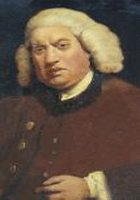Thursday, January 1, 2004
The Vanity Of Human Wishes Comments
Rating: ★5.0
Let observation with extensive view,
Survey mankind, from China to Peru;
Remark each anxious toil, each eager strife,
And watch the busy scenes of crowded life;
...
Read full text

I have to include Johnson in my top 50, although he is not principally known as a poet. Today he is probably best remembered as the author of the first dictionary in English and to some extent as a critic. Johnson himself admitted he had no originality as a poet and both of his best and finest poems are what he called 'imitations' of the Roman poet Juvenal. My latin is rudimentary and I have no way of telling how good the originals are but both this and 'London', the other great satire Johnson wrote - sadly not included in poethunter.com - are both masterly. 'The Vanity of Human Wishes' is not easy reading and I was going to choose 'London' as my best example of his writing. But they are both dense and relentlessly epigrammatic, as well as an extremely pessimistic view of human nature, one that it is hard, however, to disagree with, given their breadth of vision and unparalleled range of example. The 18th century did not value originality in the way that we do, which obviates comparison with that other great gloomy view of human nature, TS Eliot's 'Four Quartets', it always preferred style over content, 'What oft was thought but ne'er so well expressed', which may account for a certain remorseless in Johnson's search for perfection of expression and rather too great a reliance on epithet, but the poem nevertheless has a very strong unity and is one of the few in English one can re-read several times always gaining more from the experience. For all his efforts, however, Johnson never found the 'killer phrase' which is perhaps why this poem is not as well known as it might otherwise have been.